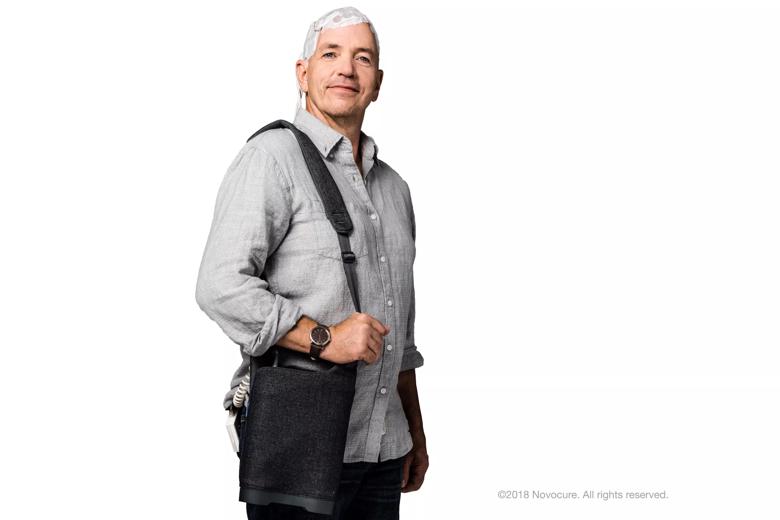First new medical intervention in a decade to demonstrate improved survival
Final results of a large multicenter trial show that adding a novel treatment modality — known as tumor-treating fields (TTFields [OptuneTM]) — to standard maintenance temozolomide therapy for glioblastoma extends median overall survival by more than 25 percent and time to progression by more than 50 percent compared with temozolomide alone. The study was published in the Dec. 19, 2017, issue of JAMA.
Advertisement
Cleveland Clinic is a non-profit academic medical center. Advertising on our site helps support our mission. We do not endorse non-Cleveland Clinic products or services. Policy

Image content: This image is available to view online.
View image online (https://assets.clevelandclinic.org/transform/99c700e6-af4b-4ce3-a317-f43deb85de3c/Patient-wearing-Optune_Copyright-2018_jpg)
Photo of a patient wearing the Optune TTFields device (courtesy Novocure).
TTFields, consisting of low-intensity alternating electric fields, are delivered to the brain via surface transducer arrays adhered to the patient’s shaved head for at least 18 hours a day. The arrays are connected to a portable battery pack that weighs about three pounds, is the size of a large book and can be carried in a backpack. The intermediate-frequency (200 kHz) electric field that’s delivered interferes with mitosis during cell division, selectively targeting the rapidly dividing glioblastoma cells over normal brain tissue (see previous ConsultQD post for details).
“This is an exciting new intervention with limited side effects observed beyond local skin irritation,” says study co-author Manmeet Ahluwalia, MD, Director of the Brain Metastasis Research Program and Head of Operations in Cleveland Clinic’s Rose Ella Burkhardt Brain Tumor and Neuro-Oncology Center. “Other than temozolomide, no medical therapy until now has demonstrated a survival benefit in glioblastoma.”
The open-label trial randomized 695 patients with glioblastoma in a 2:1 ratio to either TTFields plus maintenance temozolomide therapy (n = 466) or temozolomide alone (n = 229). All patients had previously undergone tumor resection or biopsy and completed concomitant radiochemotherapy. Median time from diagnosis to randomization was 3.8 months.
Median progression-free survival from randomization was 6.7 months for patients receiving TTFields plus temozolomide versus 4.0 months for those receiving temozolomide alone (hazard ratio [HR] = 0.63; 95% CI, 0.52-0.76; P < .001). Median overall survival was 20.9 months versus 16.0 months , respectively (HR = 0.63; 95% CI, 0.53-0.76; P < .001). In addition, times to decline in cognitive measures (Mini-Mental Status Examination and Karnofsky performance score) were significantly longer in the combined-treatment group.
Advertisement
Results were consistent with the study’s interim analysis published in December 2015, which was detailed in a prior ConsultQD post. Randomization of the trial ended early after release of the interim analysis findings due to superior outcomes in the TTFields group. At that point, patients in the control arm were offered TTFields treatment and many crossed over to the combination therapy arm.
Patients were recruited from 83 sites in North America, Europe, Korea and Israel. According to Dr. Ahluwalia, Cleveland Clinic was one of the leading sites for patient accrual, with more than 20 study participants.
The FDA first approved the TTFields device in 2011 for treatment of glioblastoma that recurred or progressed after chemotherapy on the basis of a clinical trial that showed performance equal to that of commonly used chemotherapy without serious side effects. In 2015, based on preliminary findings of this current study, the FDA expanded the indication to include use in combination with temozolomide for patients with newly diagnosed glioblastoma following surgery and radiochemotherapy.
TTFields therapy is not associated with systemic side effects common to standard cancer therapies, such as nausea, vomiting, fatigue and reduced blood counts. Observed side effects are local and generally not severe: Over half of patients in this study experienced mild to moderate skin toxicity associated with the transducer arrays, with 2 percent experiencing severe skin involvement.
Dr. Ahluwalia says that the biggest inconvenience to most patients was having to shave their head every two to three days to ensure optimal electric field delivery. To derive benefit, patients need to wear the device 18 hours or more daily.
Advertisement
The JAMA study report notes that of more than 23 randomized trials conducted over the past decade evaluating new therapies or strategies for newly diagnosed glioblastoma, all but this one have failed to demonstrate improved survival. “Novel strategies for aggressive cancers such as glioblastoma are desperately needed,” Dr. Ahluwalia observes. “Tumor-treating fields offers an important contribution to our toolbox for fighting this disease.”
He adds that TTFields therapy is now being tested for use against ovarian, lung and pancreatic cancers.
Advertisement
Advertisement

Radiation therapy helped shrink hand nodules and improve functionality

Standard of care is linked to better outcomes, but disease recurrence and other risk factors often drive alternative approaches

Phase 1 study demonstrates immune response in three quarters of patients with triple-negative breast cancer

Multidisciplinary teams bring pathological and clinical expertise

Genetic variants exist irrespective of family history or other contributing factors

Study shows significantly reduced risk of mortality and disease complications in patients receiving GLP-1 agonists

Structured interventions enhance sleep, safety and caregiver resiliency in high-acuity units

Addressing rare disease and challenging treatment course in an active young patient